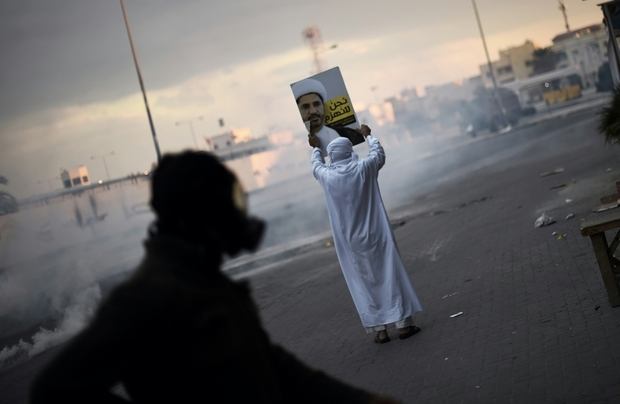Today, 1 March 2018, the High Criminal Court again postponed the arbitrary new trial of Sheikh Ali Salman, Sheikh Hassan Ali Juma Sultan, and Ali Mehdi Ali Al Aswad – all leaders of the now-dissolved Al-Wefaq opposition group – over accusations that they conspired with Qatar to overthrow the Bahraini government in 2011. The court’s decision came after the Public Prosecution Office “demanded its right to pleading,” which will be granted at the next hearing on 8 March.
Sheikh Salman, the only defendant presently detained, was originally arrested in December 2014 and ultimately sentenced to four years in prison for “inciting disobedience and hatred in the kingdom” in relation to political speeches he delivered as the Secretary-General of Al-Wefaq. In November 2017, as his prison term was gradually nearing its end, the government abruptly brought this new set of charges against Sheikh Ali, accusing him and his fellow Al-Wefaq members of: “exchanging intelligence information with a foreign country [Qatar] to carry out hostile acts against Bahrain, undermine its political and economic status as well as its national interest to overthrow the political system…[and] divulging defence secrets to a foreign country, accepting money from that foreign country in consideration for providing it with military secrets and information about the internal situation of the country, spreading tendentious rumours and fallacies abroad to weaken the financial confidence in the Kingdom and undermine its prestige.” Although the allegations date back to 2011 – when attempted mediation between Qatar, the Bahraini government, and the opposition was open and well-documented – the authorities only brought charges after Bahrain joined Saudi Arabia, the United Arab Emirates, and Egypt in a diplomatic dispute with Qatar beginning in June 2017. Bahrain’s penal code provides that “capital punishment shall be inflicted upon any person who spies for a foreign country or communicates therewith or with any person acting on its behalf to carry out hostile actions against the State of Bahrain,” suggesting that Sheikh Salman could face the death penalty if convicted.
As in recent trials against other civil society leaders like human rights defender Nabeel Rajab and former political activist Khalil al-Halwachi, the government has repeatedly postponed the trial of Sheikh Salman, Sheikh Sultan, and Al Aswad since it began in November 2017.
The new charges against Sheikh Salman – and the in absentia prosecution of Al-Wefaq members Sheikh Hassan Ali Juma Sultan and Ali Mehdi Ali Al Aswad – come during a wider assault on political opposition ahead of the 2018 elections for Bahrain’s lower house of parliament. Last week, on 19 February, Bahrain’s highest court confirmed the July 2016 dissolution of Al-Wefaq and, in 2017, the government forcibly dissolved Wa’ad, the largest secular leftist society. Following the early closure and judicial harassment of other groups like Amal and Al-Wahdawi, there are effectively no major opposition groups operating independently in Bahrain. Moreover, the authorities indefinitely suspended Bahrain’s only independent newspaper, Al-Wasat, ultimately forcing it to close in 2017. These actions have all but closed political space in Bahrain, leaving no free press to report on the elections and no opposition to participate in them.





